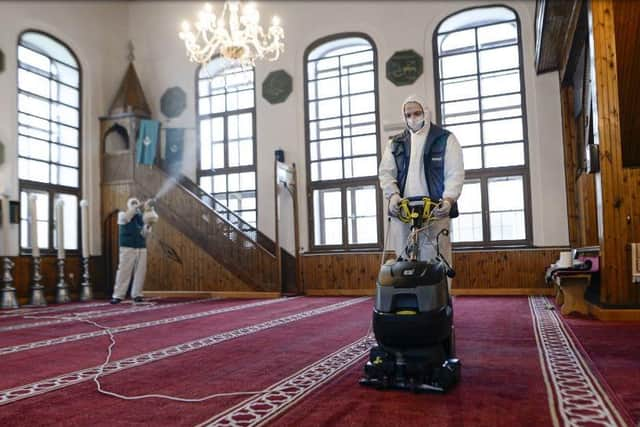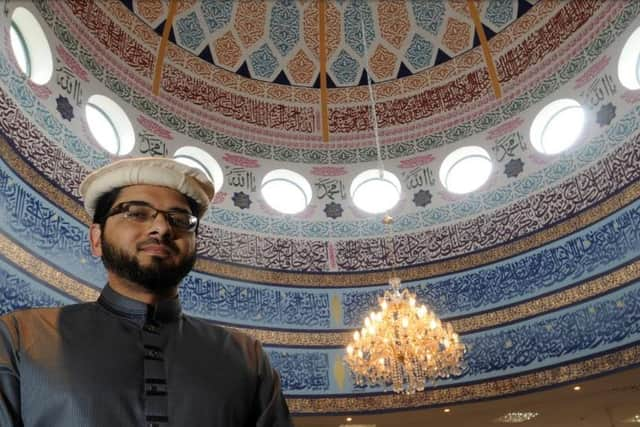Leeds imam Qari Asim: Why we must embrace a different kind of Ramadan this year
And it will undoubtedly be different this year, just as Easter and Passover have been observed by Christian and Jewish communities, in ways that might feel unnatural, but almost certainly unite us all. The Coronavirus lockdown has meant that mosques are closed and that fasting, praying and Iftars will be done behind closed doors.
A frustrating and painful time for many, but the protection of human life is the shared priority for all faith leaders across the country, and indeed throughout the world. I, with The Mosques and Imams National Advisory Board (MINAB), have issued guidance to the Muslim community on how we can embrace a different kind of Ramadan this year.
Advertisement
Hide AdAdvertisement
Hide AdWe must continue to observe the lockdown measures during Ramadan, as congregating in large groups will risk the lives of ourselves and others. We must remember that although the doors of mosques have been closed, God is ever present in our lives. The current situation can be turned into an opportunity to feel the presence of God in a much more personal and powerful way.


I too am feeling the unease of how Ramadan will be this year. Ramadan without a mosque, or large social gatherings, is strange to British Muslims but at the same time not
completely unheard of in Islam. When Islam started over 1,450 years ago, there were no grand Iftar events and hundreds of people did not gather in mosques for night prayers.
Coronavirus allows us to observe Ramadan as it was initially observed in the early days of Islam, which for me personally as an Imam is extremely powerful.
Advertisement
Hide AdAdvertisement
Hide AdThe feeling of being distant from the outside world and the loss of our usual social interactions can be extremely challenging, but interestingly one of the purposes of Ramadan is to retreat from our social life to devote more time to our own spiritual and mental well-being. So, in this way isolation can be turned into a productive and positive period for spiritual connectivity.


Religious guidance offers us the chance to shape our Ramadan in the light of the past and with a vision for the future. This year, staying at home is our sacrifice and one of the ways we support the national effort, as we look forward to being together again in the future.
I have been extremely humbled to be a faith leader in such unprecedented times, as people and organisations are coming up with new and innovative ways of observing and celebrating Ramadan.
Our MINAB members usually host the Open Iftar events, inviting people of all backgrounds to celebrate the breaking of fast in mosques, but this year it will be captured on Zoom. I
Advertisement
Hide AdAdvertisement
Hide Adsee this as an opportunity for people across the world to observe Ramadan from their homes and still celebrate the community spirit.
A significant part of Ramadan is giving to charitable causes, or those less fortunate than us. This year, I am encouraging the Muslim Community, along with other Imams across the
country, to donate the money they would have ordinarily spent in organising a community Iftar to their local foodbank, or volunteer to provide food items to vulnerable people in
their neighbourhoods.
I’ve seen lots of amazing Muslim volunteers give up their time to support their community, for example by delivering food to the NHS workers, or offering mosque space to be used by the local hospital.
Advertisement
Hide AdAdvertisement
Hide AdWe know there are many Muslims working in the NHS and emergency services, and as a result we are seeing more Muslim lives being lost. We have seen that Muslim doctors were among the first to lose their lives on the front line of the pandemic.
Coronavirus has also impacted the traditional ways of providing religious and spiritual guidance, and teaching. Leaders from all faiths have launched online services to bring
their communities together.
For the past 15 years, I have been delivering a daily sermon at Makkah Mosque, Leeds, throughout Ramadan but this year I will be delivering this online via Facebook livestream. I also led the first weekly sermon broadcasted by the BBC earlier this month, a service for Imams across the country to contribute to, as Mosques remain shut.
I used to see hundreds of people in my mosque every Friday, but with social media virtual streaming, and the power of the Radio, I am still able to connect and engage with my
Advertisement
Hide AdAdvertisement
Hide Adcommunity and even with some people who might not normally attend in person.
In spite of present challenges, and vitriolic anti-Muslim comments by some, flames of hope must not be extinguished. In the not too distant future, I know mosques will be as full as
they have ever been and we will look back on this time with pain of course, but also with pride that we pulled together while physically we were apart. We are in this together, and
I am confident we will have a Ramadan to remember.
Qari Asim MBE is the chair of Mosques & Imams National Advisory Board, the deputy chair of Anti-Muslim Hatred Working Group, senior Imam at Makkah Mosque Leeds
Advertisement
Hide AdAdvertisement
Hide Adand the Independent Adviser to the Government on the definition of Islamophobia.
Editor’s note: first and foremost - and rarely have I written down these words with more sincerity - I hope this finds you well.
Almost certainly you are here because you value the quality and the integrity of the journalism produced by The Yorkshire Post’s journalists - almost all of which live alongside you in Yorkshire, spending the wages they earn with Yorkshire businesses - who last year took this title to the industry watchdog’s Most Trusted Newspaper in Britain accolade.
And that is why I must make an urgent request of you: as advertising revenue declines, your support becomes evermore crucial to the maintenance of the journalistic standards expected of The Yorkshire Post. If you can, safely, please buy a paper or take up a subscription. We want to continue to make you proud of Yorkshire’s National Newspaper but we are going to need your help.
Advertisement
Hide AdAdvertisement
Hide AdPostal subscription copies can be ordered by calling 0330 4030066 or by emailing [email protected]. Vouchers, to be exchanged at retail sales outlets - our newsagents need you, too - can be subscribed to by contacting subscriptions on 0330 1235950 or by visiting www.localsubsplus.co.uk where you should select The Yorkshire Post from the list of titles available.
If you want to help right now, download our tablet app from the App / Play Stores. Every contribution you make helps to provide this county with the best regional journalism in the country.
Sincerely. Thank you.
James Mitchinson
Editor